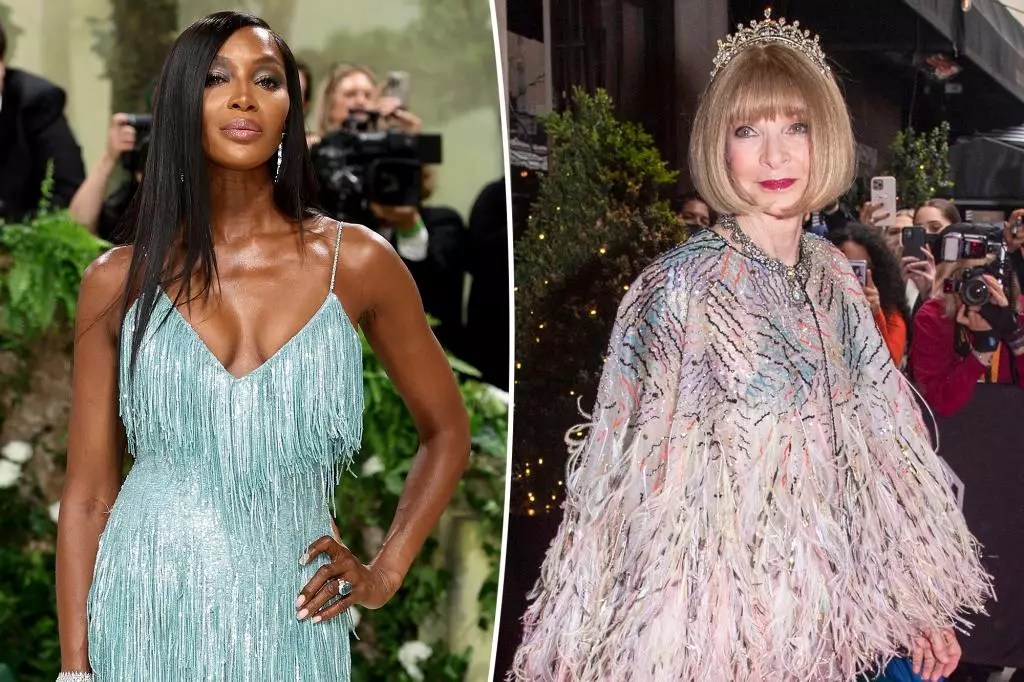Naomi Campbell, a figure synonymous with high fashion and an indelible icon within the modeling industry, stirred a whirlwind of discussions recently by announcing her decision to skip the prestigious 2025 Met Gala. This year’s gala, themed “Superfine: Tailoring Black Style,” was poised to celebrate the immense contributions of Black dandyism to fashion—a topic Campbell has evidenced firsthand throughout her illustrious career. Her decision, however, sparked considerable speculation regarding her relationship with Anna Wintour, the event’s formidable organizer.
Campbell, in a heartfelt Instagram post, expressed both her admiration for Wintour and the event while highlighting the importance of the theme in honoring the complexities of Black fashion evolution. Despite her commitments preventing her attendance, her words dripped with appreciation for an industry that has long celebrated her as a queen among women. It is here, within this paradox of absence and presence, that we find the crux of a fashionable narrative steeped in gratitude and unvoiced tensions.
Friendships Beyond the Spotlight
In her Instagram announcement, Campbell famously paid homage to her late friend and celebrated stylist, André Leon Talley, whose influence on fashion remains monumental. The tribute was not merely a nod to nostalgia but rather an essential part of her identity—reflecting the connections that molded her into the powerhouse she is today. The absence of Campbell at an event laden with potential for creativity, exploration, and shared heritage underlines not just a personal choice, but speaks to the broader structures within the fashion industry.
At the heart of Campbell’s absence lies an undercurrent of complexity. Her relationship with Wintour has become fraught in the public eye, especially following a somewhat icy exchange at the 17th Fashion Row Fashion Show. Here, Wintour’s remarks on Campbell’s punctuality revealed a crack in their long-coexisting partnership. This dynamic hints at a more profound rift that transcends personal agendas; it mirrors a broader belief in accountability and respect in spaces traditionally dominated by a select few.
Societal Reflections in Fashion
Campbell’s decision to abstain from the Met Gala can be interpreted as an act of independence. In a society where celebrity attendance often doubles as a public relations tactic, opting out becomes a powerful statement. By refusing to engage in the glitz and glamour that often glosses over the intricate threads of cultural appropriation and representation, Campbell stands firm in her conviction to honor her roots and the legacy of those who paved the way for her success.
Every illustrious Met Gala serves as an exhibition not just of style but also of the evolution of societal values. As music and fashion increasingly intersect with activism, Campbell’s absence begs the question: Is the fashion world evolving in a way that truly celebrates diversity and acknowledges the complexities of its historical narratives? The themes chosen for such events are more than just aesthetic statements; they are cultural narratives waiting to be unpacked.
The Influence of an Era
Naomi Campbell’s journey in fashion dates back to 1990, a time when she shattered glass ceilings and became an emblem of beauty and resilience. In her illustrious career marked by numerous Met Gala appearances, her presence signified a celebration of identity that was long overdue in a predominantly Eurocentric industry. Yet, her absence in 2025 springs forth a dialogue on the very fabric of the fashion industry and its capacity for genuine inclusivity.
The evolving narrative around Campbell and Wintour serves as a stark reminder that behind the glamour lies a persistent struggle for representation and equity—struggles often masked by designer gowns and dazzling jewelry. The very atmosphere of the Met Gala, a testament to the blending of creativity and high society, can at times fall short of adequately honoring the voices of those it aims to celebrate.
Through her absence, Campbell is not merely stepping away from a glamorous affair; she is eliciting introspection on the fashion industry itself. If the Met Gala symbolizes more than mere opulence, can we truly have a fashion celebration that overlooks the contributors’ narratives it seeks to honor? As the fashion world continues to grapple with these questions, Naomi Campbell’s legacy as both a model and a force for change stands resilient amidst a landscape begging for reflection.







Leave a Reply